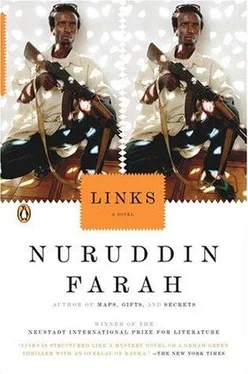“I haven’t had the desire to meet him ever,” Seamus said. “The things I’ve heard about him haven’t encouraged me to.”
“I met him briefly, that’s all.”
“And Shanta?”
“Not yet, but I plan to.”
Jeebleh looked at his right hand, palm up, and stared at where the heart line veered toward his middle finger. He asked, “Have you met Af-Laawe?”
After some reflection, Seamus said, “Af-Laawe, the Marabou, is sure to discover the whereabouts of the dead, in whatever state they’re in. I would seek him out if I hadn’t any idea in which of the many cemeteries someone was buried. The man’s death instinct contrasts well with Bile’s life instinct.”
“What do you think about him?”
“He gives me the shudders.”
As the conversation paused again, Jeebleh remembered their youthful, energetic days, when to pass the time they took turns completing each other’s unfinished sentences. When they engaged each other in that kind of banter, fellow students who joined them found it difficult to keep up. Often, even the languages changed — from Italian to English, then perhaps to Arabic. Toward the end of their stay in Padua, Seamus had picked up the basics of Somali.
Jeebleh would have to run a fever of nerves before reintroducing the seesawing games of their younger days in Italy. Most likely, it wouldn’t work here, in troubled Somalia. He asked, “Did you come to Mogadiscio before or after the Marines landed?”
“I arrived in Mogadiscio in 1992,” Seamus said. “I was head of an advance team charged with assessing the needs of the United Nations offices. I was to set up the translation units. The UN intervention was estimated to cost more than one hundred million U.S. dollars for that year alone. We put up a guesthouse, which doubled as our office. Because we hadn’t the authority to hire any local staff, New York imported Somalis with American passports. And you had old British colonial officers running the show: former BBC staffers, chummy with the former dictator, who served as consultants to the UN. I remember an Englishman who kept yattering at me about clan warfare, and how the combined efforts of the U.S. and the UN would sort out the mess. Sod it, it was utter rubbish. Left to me. I would’ve committed the lot to a nuttery, the self-serving imbeciles.”
“How did you and Bile meet?”
“I shared a table at the guesthouse with an Italian-American woman who was on an advance mission to open the UNICEF office,” Seamus said. “She mentioned his name in passing. I looked him up. It wasn’t difficult to find him.”
“Was he living alone then?”
“He was spending a lot of time at Shanta’s, with Raasta, even though he was living in shoddy settings. He had the bare minimum when I first visited him. We talked, and he shared some of his visions with me, visions that took a different form every time we met.” As he spoke, Seamus bit at his fingernails, to the flesh, at times making it difficult for Jeebleh to understand what he was saying.
“Did you recognize each other when you met?”
“He didn’t recognize me,” Seamus said.
“Because of the beard?”
“I hadn’t grown one then.” He looked into Jeebleh’s eyes, as if focusing on some distant horizon, and then sipped his coffee.
“You didn’t expect him to recognize you?”
“For one thing, my name would’ve been the furthest thing from his mind,” Seamus said. “Also, the civil war had had a disorienting effect on him — he was concentrating on minimal survival. But he recognized my voice the moment I spoke a full sentence.
“I went to visit him at The Refuge. He was quieting a toddler who was having a convulsive crying fit. The girl fell silent on seeing me come closer, and from the way she stared at me, you might have thought she knew me from somewhere else. She rose to her full height and wobbled away, past me, up to the new playhouse, where Raasta was playing with blocks.”
“And then?”
“A thousand memories were condensed into a giant singular memory, which dwarfed all others, and I recited a verse from Dante’s Inferno, in which enslaved Somalia was a home of grief, a ship with no master that was floundering in a windstorm.”
“Then he recognized you?”
“And I stayed to help at The Refuge.”
“Just like that?”
“Just like that!”
“What else?” Jeebleh asked.
“I don’t know why I thought about olives then — olive fruits, olive trees, and olive wood,” Seamus said. “Or why my mind went quietly about its thoughts in the way bees go contentedly about their motion, each droning note resulting from the previous one. I had no idea if the thought about olives came to me because we had been in Italy when we last met. Or if the fine polish of Bile’s smooth skin reminded me of olive leaves, dark green on one side, silvery on the other. It could be that I was comparing our friendship to the olive tree. Because when the top branches die, a fresh trunk with a new lease on life emerges. And the tree bears fruit between the ages of five to ten years, and may not reach full maturity until after twenty!”
Thinking about friendship and about olives and their fruits, Jeebleh recalled the times they had been through as friends, and asked himself where he had heard the phrase “the country of our friendship,” and decided that Bile had spoken the words; now the image Seamus used to describe his and Bile’s friendship was an olive tree. When he turned to his friend to ask, Seamus’s eyelids were like moths at rest, leisurely wrapping their wings over their bodies, in contented contemplation of their own mortality.
“And then what?” Jeebleh said.
“Raasta took to me,” Seamus said.
“Right away?”
“She consented to sit on my lap the first time I invited her. It was love at first sight, mutual.”
“What of Faahiye?”
“I didn’t meet him until after my third visit. And when I did, I had the feeling that there was something wrong, and that he and Shanta had ballsed up their marriage. I could see that was affecting Raasta in a negative way. I worked out for myself that Faahiye was the primary source of the discord.”
“What was Raasta like?”
“She was very striking.”
“Because of the dreadlocks?”
“Actually, you might have assumed she was Bile’s daughter if you hadn’t known, because of the family resemblance. Also, she was very comfortable around him. They touched a lot, the two of them, they touched all the time.” Tears filled Seamus’s eyes.
“And when you eventually got to know Faahiye?”
“He made me think of a tree that has never flowered,” Seamus said. “You might think he was from another, older world. He took everything personally, and because of this, he hurt easily.”
Not knowing what else to say, but wanting to make a remark, Jeebleh said, “I hope the girls are unhurt.”
Seamus, looking exhausted, covered his mouth and yawned. “Is there anything I can do for you before I go back to bed?” he asked.
“Could you give me directions to Shanta’s?”
Seamus obliged, then returned to his room.
BRIDGES SEPARATE THE TWO SIDES THEY JOIN, JEEBLEH THOUGHT, AS HE took long, eager strides on the way to Shanta’s. He kept consulting the mass of squiggles passing for a map that Seamus had drawn as though from bad memory. Now he came to a stop, and looked this way and that, and then at the piece of paper, which he held at trombone distance. He had forgotten to bring along his reading glasses. With no prominent landmarks to guide him, and no street names either, he was unable to determine whether some of the asterisks represented two- or three-story buildings reduced to rubble or crossroads. Was he to turn left here, go a hundred meters or so, then turn right at the next destroyed building? He went on nonetheless, with the confidence of a man who knows where he is headed.
Читать дальше












